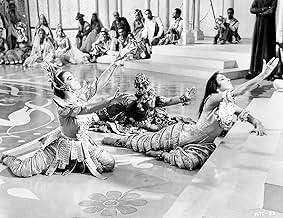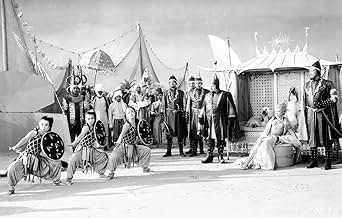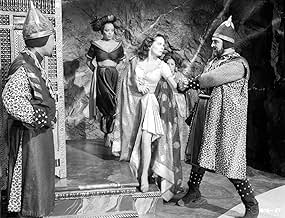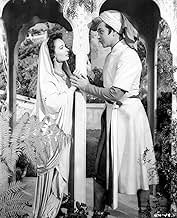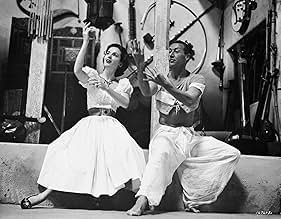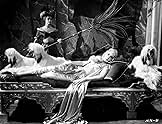IMDb RATING
6.3/10
1.8K
YOUR RATING
A roguish poet is given the run of the scheming Wazir's harem while pretending to help him usurp the young caliph.A roguish poet is given the run of the scheming Wazir's harem while pretending to help him usurp the young caliph.A roguish poet is given the run of the scheming Wazir's harem while pretending to help him usurp the young caliph.
Ray Aghayan
- Brave Shopkeeper
- (uncredited)
Ed Agresti
- Nobleman
- (uncredited)
Richard Alameda
- Nobleman
- (uncredited)
Suzanne Ames
- Harem Showgirl
- (uncredited)
Jan Arvan
- Manservant
- (uncredited)
William Bagdad
- Wholesaler
- (uncredited)
Ross Bagdasarian
- Fevvol
- (uncredited)
Rama Bai
- Plump Ayah
- (uncredited)
Featured reviews
I saw this movie version and have always loved it. I also saw the stage version, but who could be better than Howard Keel. I felt like a "Stranger In Paradise." I have always been a movie musical buff and a big fan of Mr. Keel. When I first saw the movie as a child, I felt transported back to that time period (even if it was a Hollywood movie). The beautiful music and romance contained within makes you feel wonderful. And you can imagine all the romance, adventure and "Baubles, Bangles and Beads" you could ever wish for and all in the time and space of this lovely movie with beautiful music. Thank you Howard Keel, Ann Blyth, Vic Damone and company for one of my favorite movie memories.
Given the times we're in and the changing public tastes in music, I'm not sure how well a revival of Kismet as a Broadway show would do today. Certainly the music of Alexander Borodin remains timeless, but a show with an Arabian Nights setting, I'm not sure would go over so well right now.
The Broadway show with Alfred Drake, Doretta Morrow, Richard Kiley, and Joan Diener ran for 583 performances in the 1953-54 season and won a Tony Award. As none of those worthy performers were movie names, Arthur Freed recast the film with MGM players Howard Keel, Ann Blyth, Vic Damone, and Dolores Gray and I've sure got no complaints about any one of them.
But Kismet has an older an more varied history. It was first presented on Broadway as a straight dramatic play in 1911, written by Edward Knoblauch and providing a career role as Hajj the beggar king for Otis Skinner. He must have done the role a gazillion times on Broadway and in touring companies.
Skinner even did two films, a silent and early sound version that I believe are both lost. It then got a film version with Ronald Colman as Hajj and it co-starred Marlene Dietrich, James Craig and Joy Page. Colman spoke the lines in the inimitable Colman fashion, but the music score that Harold Arlen and E.Y. Harburg wrote was singularly bland.
Nothing bland about the themes of Alexander Borodin which Robert Wright and Chet Forrest arranged and wrote lyrics for to provide a far better musical score. Two songs, Strangers In Paradise and Baubles Bangles And Beads were chart toppers in the first half of the Fifties. I well remember as a child hearing both played on the radio a lot.
The plot of the story centers around the nimble tongued Keel as Hajj who gets himself involved in palace politics with the Wazir/Prime Minister of the old Caliphate of Bagdad played by Sebastian Cabot and his wife Dolores Gray who's taken a real fancy to Keel. At the same time the Caliph on one of his nocturnal wanderings of legend has fallen for Keel's daughter Ann Blyth. The Caliph is played by Vic Damone. Both plot elements come together for an inevitable conclusion which I think you can figure out.
Vincente Minnelli did a great directing this old chestnut, impeccably cast with great musical performers. Songwriting because of who inspired it, doesn't get any better than this.
The Broadway show with Alfred Drake, Doretta Morrow, Richard Kiley, and Joan Diener ran for 583 performances in the 1953-54 season and won a Tony Award. As none of those worthy performers were movie names, Arthur Freed recast the film with MGM players Howard Keel, Ann Blyth, Vic Damone, and Dolores Gray and I've sure got no complaints about any one of them.
But Kismet has an older an more varied history. It was first presented on Broadway as a straight dramatic play in 1911, written by Edward Knoblauch and providing a career role as Hajj the beggar king for Otis Skinner. He must have done the role a gazillion times on Broadway and in touring companies.
Skinner even did two films, a silent and early sound version that I believe are both lost. It then got a film version with Ronald Colman as Hajj and it co-starred Marlene Dietrich, James Craig and Joy Page. Colman spoke the lines in the inimitable Colman fashion, but the music score that Harold Arlen and E.Y. Harburg wrote was singularly bland.
Nothing bland about the themes of Alexander Borodin which Robert Wright and Chet Forrest arranged and wrote lyrics for to provide a far better musical score. Two songs, Strangers In Paradise and Baubles Bangles And Beads were chart toppers in the first half of the Fifties. I well remember as a child hearing both played on the radio a lot.
The plot of the story centers around the nimble tongued Keel as Hajj who gets himself involved in palace politics with the Wazir/Prime Minister of the old Caliphate of Bagdad played by Sebastian Cabot and his wife Dolores Gray who's taken a real fancy to Keel. At the same time the Caliph on one of his nocturnal wanderings of legend has fallen for Keel's daughter Ann Blyth. The Caliph is played by Vic Damone. Both plot elements come together for an inevitable conclusion which I think you can figure out.
Vincente Minnelli did a great directing this old chestnut, impeccably cast with great musical performers. Songwriting because of who inspired it, doesn't get any better than this.
Kismet isn't a complete waste of time but director Minelli was itching to do Lust for Life and had little enthusiasm for this assignment, which engaged his abilities, but not his sympathies. Unfortunately, it shows. Like Brigadoon and a few other musicals, this was one case where the Freed factory failed despite some gorgeous singing by the principals (Vic Damone is no actor but he ravishes "Stranger in Paradise"). Some numbers are shorn from the score, which doesn't hurt much but some are added, which does. There's a stale, formulaic quality to this movie and Kismet is a hothouse flower that doesn't thrive under M-G-M's "crunch-it-out" treatment. More imagination and taste were needed. There are several good recordings of the score and I'd suggest that, if you like the music (what's not to like?), you experience Kismet aurally.
This is musically the most glorious Broadway show of them all. in my judgment; and the most opulent of all filmed musicals in its sound, lyrics and colorful presentation. Of course, it might have been made differently, or better, or smaller or larger. But I am personally glad, as its biggest fan, and as writer, singer, songwriter, critic and moviegoer, that the film was made as honestly as it was. To begin with, the cast is vocally (unarguably) very fine; the two songs omitted, "Was I Wazir" and "He's in Love" were stage songs, without movement and needed omitting. The direction by Vincente Minnelli is very solid and generally fine, the use of color unprecedented. And this film has Howard Keel's best movie role ever, Ann Blyth lovely and seemingly young as his daughter, Sebastian Cabot as the wicked Wazir, Jay C. Flippen as his bandit father, suggestively sexy Dolores Gray as Lalume, and Vic Damone as the lovestruck very-young Caliph. The film's story-line follows the revived stage-play which was adapted to musical purposes in the early 1950s, for Broadway. The main storyline involves an ingenious but penniless poet, a maker of rhymes, who has a daughter; she wants a better life, he wants a better life for her. He finds gold, which a famous bandit claims as his own; but the gold buys him instant wealth; his arrest because he cannot account for the wealth nearly gets him killed; but he sells the idea that he is a magician to the Wazir and fortune favors his predictions. Four other strands are also interwoven in the deft and very entertaining plot. His daughter has met and fallen in love in a garden with the young Caliph without recognizing him; the wicked Wazir of the empire is pressing the young ruler to marry one of the Wazir's choices for monetary advantage; the Wazir's sexy favorite wife falls in love with the poet; and the bandit chief is seeking his long-lost son, who turns out to be the wicked Wazir. All the strands meet when to save his daughter from being forcibly married to the Wazir (to keep her from the Caliph who is still searching for her), the poet tries to drown the Wazir who has had his bandit father murdered when he's found him,and the Caliph alone can set things to rights when he discovers what his true enemy has been plotting. The poet accepts banishment--with Lalume--at an oasis, the daughter marries the Caliph, and the story ends in a splendid wedding. Robert Wright adapted the songs from the music of Aleksandr Borodin. Charles leader and Luther Davis get the credit for the literate screenplay; The sterling cinematography was done by Joseph Ruttenberg, art direction by Cedric Gibbons and E. Preston Ames, with set decoration by F. Keogh Gleason and Edwin Willis. Tony Duquette created the elaborate costumes for this Arabian Nights romp with hairstylings by Sydney Guilaroff and makeup by William Tuttle. Some of the lovely songs from this show are among the brightest lyrics and most beautiful melodies in Broadway--and Hollywood--history. The showstoppers are "Stranger in Paradise", "This is My Beloved", "The Olive Tree", "The Song of the Hand", Not Since Nineveh", Baubles, Bangles and Beads", "Night of My Nights", "Sands of Time" and "Rahadlakum". Among the performers, Dolores Gray is incomparable in the part, and Howard Keel very good in every respect. Among the others involved, Jack Elam, Ted de Corsia, Monty Wolley, and Flippen contribute good work. With a bit more money to expend, outdoor locations could have expanded the film. But most viewers who discover this film fall under the spell of its opulent and beautifully-pacing opening and find the production, as do professionally and personally, very enjoyable indeed.
Those of you who know me know that the musical is one of my favorite film genres. I bought the obscure film The French Line sight unseen because I'd heard one cute song from it, and once I watched Guys and Dolls twice in a week. I don't know why it took me so long to finally watch the film version of Kismet, but I only saw it for the first time a few months ago.
Howard Keel, in the lead role as a glib poet able to talk-or sing-his way out of any predicament, is really incredible. He performs the show-stopping number "Gesticulate" as only he could: stylized, over-the-top but still accessible, and with charm but without conceit. He carries the movie, outclassing his costars by head and shoulders, but since he's in so much of the film, it doesn't really matter that the scenes he's not in drag a little.Ann Blyth, Howard's daughter, is very pretty but she's given a bland and uninteresting romantic partner in Vic Damone. If your favorite songs in Kismet are the ballads "Stranger in Paradise" and "This Is My Beloved," you'll be severely disappointed in Vic's voice type. If you don't really care about two young kids in love and prefer more upbeat tunes, you'll be fine, since Howard Keel and Dolores Gray sparkle with chemistry.
Don't laugh, but my favorite song in the show was Dolores Gray's dazzling number "Not Since Nineveh". The reason this musical isn't watched or performed anymore is because you just can't give rousing applause to a song that starts with the line "Baghdad! Don't under-estimate Baghad!" However, if you're able to put foreign affairs aside-which is essential if you're going to sit down and watch Kismet-Dolores's song is fantastic. She's beautiful and has a stunning figure, clad in inventive costumes by Tony Duquette, and she has a very nice alto voice that sells a song beautifully. Between her and Howard, it's easy to forget anyone else is even in the movie!
For musical aficionados, you should probably check out Kismet if you haven't already. You'll hear some beautiful singing-not by Vic Damone, though-and watch some incredible dancing by Reiko Sato, Patricia Dunn, and Wonci Lui. Plus, the story is very fast-paced, clever, and entertaining, a feature not always included in a musical comedy. Even without the songs, it would still be an interesting movie.
Howard Keel, in the lead role as a glib poet able to talk-or sing-his way out of any predicament, is really incredible. He performs the show-stopping number "Gesticulate" as only he could: stylized, over-the-top but still accessible, and with charm but without conceit. He carries the movie, outclassing his costars by head and shoulders, but since he's in so much of the film, it doesn't really matter that the scenes he's not in drag a little.Ann Blyth, Howard's daughter, is very pretty but she's given a bland and uninteresting romantic partner in Vic Damone. If your favorite songs in Kismet are the ballads "Stranger in Paradise" and "This Is My Beloved," you'll be severely disappointed in Vic's voice type. If you don't really care about two young kids in love and prefer more upbeat tunes, you'll be fine, since Howard Keel and Dolores Gray sparkle with chemistry.
Don't laugh, but my favorite song in the show was Dolores Gray's dazzling number "Not Since Nineveh". The reason this musical isn't watched or performed anymore is because you just can't give rousing applause to a song that starts with the line "Baghdad! Don't under-estimate Baghad!" However, if you're able to put foreign affairs aside-which is essential if you're going to sit down and watch Kismet-Dolores's song is fantastic. She's beautiful and has a stunning figure, clad in inventive costumes by Tony Duquette, and she has a very nice alto voice that sells a song beautifully. Between her and Howard, it's easy to forget anyone else is even in the movie!
For musical aficionados, you should probably check out Kismet if you haven't already. You'll hear some beautiful singing-not by Vic Damone, though-and watch some incredible dancing by Reiko Sato, Patricia Dunn, and Wonci Lui. Plus, the story is very fast-paced, clever, and entertaining, a feature not always included in a musical comedy. Even without the songs, it would still be an interesting movie.
Did you know
- TriviaIt was Vernon Duke who suggested Bob Wright and Chet Forrest use the music of Aleksandr Borodin as a basis for their score.
- GoofsPrior to the start of "Not Since Nineveh", Dolores Gray takes the gold purse from the Wazir to throw coins. When she's finished, she tosses it back to Sebastian Cabot which the actor fumbles and drops at his feet. During the song, the bag disappears and reappears at times and ends up behind his feet. It finally disappears by the end of the dance.
- Quotes
Chief Policeman: [the Poet has just been sentenced by the Wazir, and the Chief Policeman enters to find him and Lalume, the Wazir's wife, kissing] What kind of a sentence did he get?
- ConnectionsFeatured in MGM Parade: Episode #1.12 (1955)
- SoundtracksOverture
(uncredited)
Music and Lyrics by Bob Wright and Chet Forrest
Based on Themes by Aleksandr Borodin Performed by the MGM Studio Orchestra Conducted by André Previn
- How long is Kismet?Powered by Alexa
Details
- Release date
- Country of origin
- Language
- Also known as
- Un extraño en el paraíso
- Filming locations
- Metro-Goldwyn-Mayer Studios - 10202 W. Washington Blvd., Culver City, California, USA(studio: made in Hollywood, U.S.A. by)
- Production company
- See more company credits at IMDbPro
Box office
- Budget
- $2,692,960 (estimated)
Contribute to this page
Suggest an edit or add missing content


